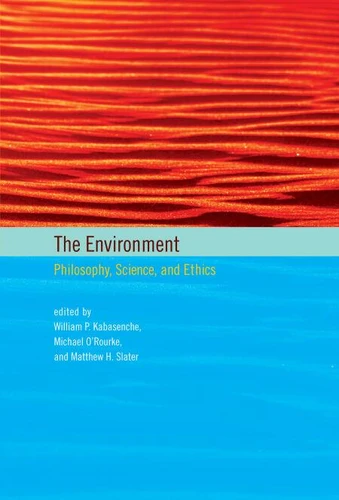The Environment. Philosophy, Science, and Ethics
Par : , ,Formats :
Disponible dans votre compte client Decitre ou Furet du Nord dès validation de votre commande. Le format ePub protégé est :
- Compatible avec une lecture sur My Vivlio (smartphone, tablette, ordinateur)
- Compatible avec une lecture sur liseuses Vivlio
- Pour les liseuses autres que Vivlio, vous devez utiliser le logiciel Adobe Digital Edition. Non compatible avec la lecture sur les liseuses Kindle, Remarkable et Sony
- Non compatible avec un achat hors France métropolitaine
 , qui est-ce ?
, qui est-ce ?Notre partenaire de plateforme de lecture numérique où vous retrouverez l'ensemble de vos ebooks gratuitement
Pour en savoir plus sur nos ebooks, consultez notre aide en ligne ici
- Nombre de pages316
- FormatePub
- ISBN978-0-262-30102-2
- EAN9780262301022
- Date de parution27/04/2012
- Protection num.Adobe DRM
- Taille873 Ko
- Infos supplémentairesepub
- ÉditeurThe MIT Press
Résumé
Original essays by leading scholars consider the environment from biological and ethical perspectives. Philosophical reflections on the environment began with early philosophers' invocation of a cosmology that mixed natural and supernatural phenomena. Today, the central philosophical problem posed by the environment involves not what it can teach us about ourselves and our place in the cosmic order but rather how we can understand its workings in order to make better decisions about our own conduct regarding it.
The resulting inquiry spans different areas of contemporary philosophy, many of which are represented by the fifteen original essays in this volume. The contributors first consider conceptual problems generated by rapid advances in biology and ecology, examining such topics as ecological communities, adaptation, and scientific consensus. The contributors then turn to epistemic and axiological issues, first considering philosophical aspects of environmental decision making and then assessing particular environmental policies (largely relating to climate change), including reparations, remediation, and nuclear power, from a normative perspective.
ContributorsKatie McShane, Robert Brandon, Rachel Bryant, Michael Trestman, Brian Steverson, Denis Walsh, Lorraine Code, Jay Odenbaugh, Joseph Cannon, Mariam Thalos, Chrisoula Andreou, Clare Palmer, Ben Hale, Kristin Shrader-Frechette, Andrew Light
The resulting inquiry spans different areas of contemporary philosophy, many of which are represented by the fifteen original essays in this volume. The contributors first consider conceptual problems generated by rapid advances in biology and ecology, examining such topics as ecological communities, adaptation, and scientific consensus. The contributors then turn to epistemic and axiological issues, first considering philosophical aspects of environmental decision making and then assessing particular environmental policies (largely relating to climate change), including reparations, remediation, and nuclear power, from a normative perspective.
ContributorsKatie McShane, Robert Brandon, Rachel Bryant, Michael Trestman, Brian Steverson, Denis Walsh, Lorraine Code, Jay Odenbaugh, Joseph Cannon, Mariam Thalos, Chrisoula Andreou, Clare Palmer, Ben Hale, Kristin Shrader-Frechette, Andrew Light
Original essays by leading scholars consider the environment from biological and ethical perspectives. Philosophical reflections on the environment began with early philosophers' invocation of a cosmology that mixed natural and supernatural phenomena. Today, the central philosophical problem posed by the environment involves not what it can teach us about ourselves and our place in the cosmic order but rather how we can understand its workings in order to make better decisions about our own conduct regarding it.
The resulting inquiry spans different areas of contemporary philosophy, many of which are represented by the fifteen original essays in this volume. The contributors first consider conceptual problems generated by rapid advances in biology and ecology, examining such topics as ecological communities, adaptation, and scientific consensus. The contributors then turn to epistemic and axiological issues, first considering philosophical aspects of environmental decision making and then assessing particular environmental policies (largely relating to climate change), including reparations, remediation, and nuclear power, from a normative perspective.
ContributorsKatie McShane, Robert Brandon, Rachel Bryant, Michael Trestman, Brian Steverson, Denis Walsh, Lorraine Code, Jay Odenbaugh, Joseph Cannon, Mariam Thalos, Chrisoula Andreou, Clare Palmer, Ben Hale, Kristin Shrader-Frechette, Andrew Light
The resulting inquiry spans different areas of contemporary philosophy, many of which are represented by the fifteen original essays in this volume. The contributors first consider conceptual problems generated by rapid advances in biology and ecology, examining such topics as ecological communities, adaptation, and scientific consensus. The contributors then turn to epistemic and axiological issues, first considering philosophical aspects of environmental decision making and then assessing particular environmental policies (largely relating to climate change), including reparations, remediation, and nuclear power, from a normative perspective.
ContributorsKatie McShane, Robert Brandon, Rachel Bryant, Michael Trestman, Brian Steverson, Denis Walsh, Lorraine Code, Jay Odenbaugh, Joseph Cannon, Mariam Thalos, Chrisoula Andreou, Clare Palmer, Ben Hale, Kristin Shrader-Frechette, Andrew Light



